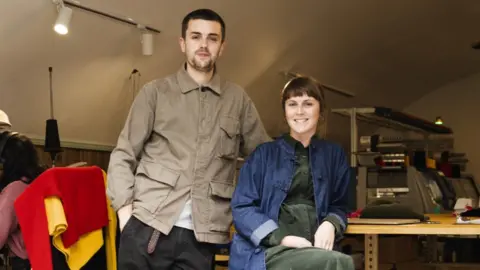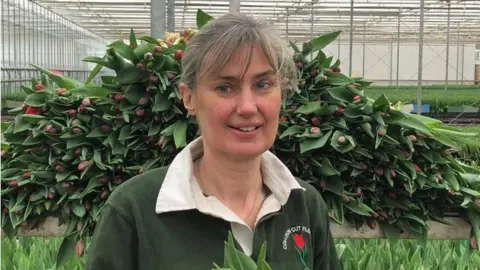What Brexit changed for clothes, flower and sausage firms
 BBC
BBCThe UK's new trading relationship with the European Union (EU) might only be a few months old.
But some businesses are struggling to adjust to the new trading landscape outside of the customs union and single market.
Firms across four different sectors share their stories of rising costs, extra paperwork and packages that never arrive.

The fashion firm - 'Customers have had to pay extra charges'
 Country of Origin
Country of OriginBen Taylor and Alice Liptrot have come a long way since they founded their knitwear brand Country of Origin straight out of university.
The couple now employ four other people and sell clothes wholesale to independent shops and to customers online.
About a third of sales, Ben says, came from customers in the EU.
"But since the end of January, it's tailed off completely."
Ben says the firm has been caught up in an "onslaught of admin" and about 80% of orders to the EU after Brexit have seen customers having to pay extra charges.

What are the new rules?
New rules have come into force for those in the UK either importing from, or exporting to, Europe.
Exactly what licenses are needed or what duties must be paid depends on what is being exported, its value, where the product originates from and to which country it is being sent, according to government guidance.
From 1 January, the UK government introduced a rule that VAT must be collected at the point of sale rather than the point of import.
This essentially means that overseas retailers sending goods to the UK are expected to register for UK VAT and account for it to HMRC if the sale value is less than €150 (£135).

One customer in the Netherlands was asked to pay an additional €100 (£88) on their order, Ben says, for "government fees", with no further explanation from customs agents.
Ben adds that the firm is not an "inexperienced" exporter, having shipped goods to Japan and the US. He says the lack of clarity on why certain charges are being raised is "frustrating".
The next step? "To get some kind of operation going in Europe - moving stock to dispatch from there because this just isn't sustainable," he says.
"I just hope this doesn't put off any other young person who wants to start a small business today."
The flower grower - 'Each load is probably costing us about £200 extra'
 Diane Collison
Diane CollisonDiane Collison has been responsible for helping her firm, Collison Cut Flowers, adapt to post-Brexit changes.
The Norfolk cut flower producer imports 35 million bulbs a year - mostly tulips from Holland, scented stock and lilies.
The government recently pushed back introducing new checks on most imported plants until 2022. But some of the bulbs imported by Collison's Cut Flowers count as "high-risk", so they have already had to make some changes.
Diane has registered the business as a "place of destination", where plants could be checked by local health teams, and for an EORI number so the firm can bring EU goods into the UK.
Day-to-day, she must email a freight forwarding business details of expected deliveries before they hit UK ports. That's on top of registering invoices and plant health certificates with UK authorities.
"Each load is probably costing us about £200 extra now - and at about 150 per year that's not an insignificant amount of money," Diane says.
The firm may soon need to increase costs for customers.
"But I'm just pleased we've managed to get our imports in and what we've done is working," Diane says, adding the firm has only seen deliveries delayed by a few hours so far.
The sausage exporter - 'Our customers are running low on stock'
 Steve Howell
Steve HowellSteve Howell's Foodlynx sells British sausages, bacon and bread to hotels and restaurants across the EU.
Typically it sends one or two trucks out a week and up to six in the peak summer season. But the Dorset-based firm suffered a three-day delay to the one shipment it has made since Brexit.
Its truck was held up at the port of Le Havre in France as customs officials questioned whether certificates for some animal products had been filled in correctly.
It was moved to another cold storage unit nearby while the issue was sorted out. Steve was charged €3,914 for storage and admin costs.
Although recent statistics show that UK exports to the EU dropped significantly in January, Steve believes other factors are at play.
"Demand dropped off due to Covid last year anyway, plus we, like many others advised our customers to stock up before Christmas to avoid these types of delays.
"Now, the customers are running low on stock and we're still trying to battle through paperwork, new labelling regulations and compliance."
"The whole point [of Brexit] was to take back control of our country," Steve says.
"We have succeeded in doing exactly the opposite because British exporters are completely and utterly blown out the water."
The car parts dealer - 'It's a lot of additional stress'
 Martyn Wilson
Martyn WilsonMartyn Wilson set up his classic car parts firm 12 years ago and about 60% of orders are shipped to the EU.
VAT is now applied at the point of sale for parts under £135 - on top of duty charged on car parts at 24%.
Citroen Classic Car Parts typically sends out 130 items per month - but difficulties arose quickly.
"For couriers, I have to supply customers' contact details - and often have to write to them in French and German to get those, which is a bit of a drama we never had to deal with before."
Deliveries into Italy, for example, have never arrived and others have been returned due to customers not paying the new charges.
"It has impacted us certainly from the mental point of view. It's a lot of additional stress and you're continually on deadlines, trying to get good reviews from customers and make sure things get delivered."
Martyn points out that he is able to deliver car parts to the US in less than 24 hours - and no tariffs are applicable on those under $700.
"I will muddle on through in the best possible way I can and maybe it'll push me to think outside the box a bit.
"Perhaps in the long-run it might be good for us, but we're going through the pain barrier."
